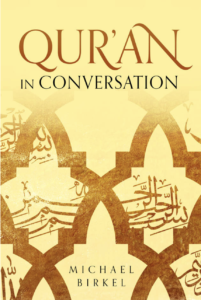Qur’an in Conversation
Reviewed by Ellen Michaud
November 1, 2014
 By Michael Birkel. Baylor University Press, 2014. 292 pages. $39.95/hardcover.
By Michael Birkel. Baylor University Press, 2014. 292 pages. $39.95/hardcover.
With Qur’an in Conversation, Michael Birkel—author, scholar, and professor of religion at Earlham School of Religion—has opened a significant conversation with 20 North American Muslim scholars, professors, and imams that illuminates the evolution of what Birkel terms a “distinctively North American expression” of Islam. Birkel writes:
While it is admittedly not an easy season to be a Muslim here in an age of such suspicion, distrust, and misrepresentation, at the same time it is intellectually and spiritually an extraordinary time and place to be a Muslim thinker and believer. Muslims from a great variety of ethnic and sectarian backgrounds meet here and respond to the particular challenges and opportunities of North America in the early twenty-first century. Political and social realities that created tensions among these groups in their places of origin often have less meaning in this new context, allowing for a vibrant coming together of people and ideas. Just as Muslims found unique and pertinent manifestations in other lands and cultures, distinctly North American expressions are evolving in response to contemporary needs and conditions.
Drawing together myriad voices that reflect this emerging Islam, Birkel reveals an Islam rooted in reverence for the Qur’an “as it is understood, and lived out in North America.”
The result is a significant gift. In a series of 24 reflective essays focused on verses and themes within the Qur’an, the voices Birkel has gathered—including those of nine women—speak with clarity, intelligence, passion, and devotion to God.
While too many North Americans tend to view Muslims as “backward people from far away” who practice a religion that is “oppressive of women, intolerant of other faiths, zealous to impose a tyrannical theocracy, and incapable of freedom of thought,” the conversations to which Birkel’s essayists contribute challenge that view and show us a completely different people. They reveal Muslims who are concerned with not just the “right” way to read the Qur’an, but with reading it in the light of its core messages—messages that emphasize mercy, justice, kindness, good deeds, care for others, and religious diversity as a divine intention.
The conversation Birkel opens among his contributors is particularly important because while American Muslims have been having these conversations among themselves for 50 years or so, the North American non-Muslim has generally not been a part of the dialogue.
This book invites us to listen in.



Comments on Friendsjournal.org may be used in the Forum of the print magazine and may be edited for length and clarity.